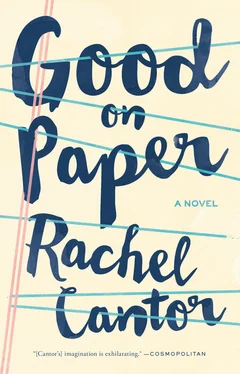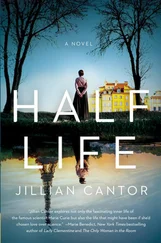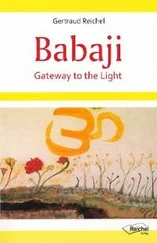Why would I do that?
To announce that you were a traveler with purpose, not some scruffy refugee?
Interesting theory, Miss Greene. And why the plural form?
Because you shared your journey with your entire generation?
He laughed.
Or maybe you preferred Romei to Roméo …
Ah, yes, the singular pilgrim! The name carry — how you say — baggage?
I smiled: at three hundred fifty pounds, Romei was no Romeo.
The whole world knows that Romei is not my given name. Only you know why I have chosen it. I am right for choosing you! This job, you are wanting?
He named an extravagant fee. Extravagant for a SuperTemp.
I don’t know, I said, trying to keep from smiling.
You want more money, he said. This is natural.
Well, I said.
He offered another ten grand, half up front. But I must agree to finish by the end of the year. I must work on no other!
No other, I said.
I send, he said.
I know, I said. Anon.
Anon, he agreed.
I got off the phone and screamed.
Ahmad came running and I jumped on him and screamed.
Shira, my ears! They are delicate mechanisms!
Ahhh! I screamed.
The New Life, it was about to begin!

New Life! As when Dante, nearly nine, sees Beatrice for the first time and cries, Incipit vita nova! I, of course, had not come up with a word , much less a Latin exclamation — only a wild howling in my best friend’s ear. But the New Life! It was suddenly so easy to imagine: exchanging insights and recipes for tiramisu with Romei at the Hungarian Pastry Shop, the translation published to mammoth acclaim, authors calling, begging for my help. I’m booked till 2020! I’d say. Twenty years? they’d reply. You expect us to wait twenty years? Montale would call, Dante himself would call: I am sorry I disappointed you, I can see how foolish I was to have believed love ordered the cosmos, to have allowed you to think your love was sanctioned by the Divine!
I could be magnanimous, finally: You ruined my life, Dantissimo, but I forgive you.
I’m proud of you, he’d add. In Latin.
Everyone would be proud! Ahmad would be proud! No more lectures about the UN. My father who art in heaven — his little girl! My mother who art who knows where? Who cared! My daughter? She’d be proudest of them all. I’d explain to her about Vita Nuova , Dante’s place in the Western canon, Romei’s place at the apex of the postmodern ridge of that canon, my place as a footnote at the apex of that ridge. Your mother, I’d say, has the mother of all opportunities. I love you when you’re amazing, she’d say.
I would be amazing, the envy of grad students everywhere!
It had been the cool kids in grad school who’d read Romei. As I labored over Provençal precedents, they read his work during marathon sessions of sexual experimentation, they assembled on his birthday to chant his famed response to Derrida, who’d once called Romei’s work seminal ( séminal ):
Who is this Derrida! What does he know!
Did he give up language! Did he learn to speak by reading!
He writes the language of lullabies! Fairy tales with happy endings!
This is the language of BETRAYAL!
Much as I longed to participate in that chanting, not to mention those marathon sessions, I resisted Romei, reading him only when forced to by my adviser. Once I did, I couldn’t rid myself of him. He peered over my shoulder when I communed with Dante: Reactionary! he’d hiss. Hunter after truth! Believer in cosmic order! Ever stalwart, I shrugged him off and wrote not of his work but his life, his tendency to offer contradictory accounts of his past.
According to his book-jacket biography, Romei was the devoutly Catholic son of a Jewish convert mother, considering the priesthood when the war broke out. When his parents were killed by the Romanian Iron Guard, he hid in a grain silo, tended there by a nun whose wimpled beauty caused him to reconsider his vocation. Still, when he left Romania in 1945, he chose Rome, hoping for new life in the shadow of the Pope.
For two decades, he lived there in obscurity, interpreting for visiting journalists, appearing in a fantasy sequence in Fellini’s 8½ , writing unremarkable verse until, in his forties, he “burst onto the scene,” as they say, with Mother Tongue , a volume of iconoclastic poems so unprecedented, so bold in their treatment of language and meaning, so uncompromising in their conflation of loyalty and betrayal, they took Europe — or at least European poets — by storm.
He followed four years later with Romance Language , poems that extended his explorations into the constitution (or lack thereof) of meaning by language. More volumes appeared in the seventies and eighties, all celebrating his trickster persona, his inauthentic voice, his disconnection from language: Bad Words, Baby Talk, Nonsense Syllables .
There were other, less flattering versions of his life, of course, and this is what I wrote about. Some claimed that Romei had learned Italian not as a student of literature, but as a prisoner of war, or as a collaborator — making him both older and less innocent than we liked to believe. He was by one account a Red Brigades sympathizer, by another, an unrepentant monarchist. One Dutch historian claimed that he’d manufactured his Jewish heritage — though whether to create sympathy for himself or deflect attention from a fascist past, she couldn’t say. A self-inflicted circumcision at the end of the war became septic, she said, leading to lifelong problems with erectile dysfunction.
What was true? The Great Man wouldn’t say. And if he did, we couldn’t believe him. We couldn’t believe a word he said (he said), about anything.
When I gave up on T. in grad school, gave up on Dante, Romei taunted me: Told you so, told you so .
This has nothing to do with you! I shouted. Dante is a fake and a liar! I hate his stupid freakin’ lyin’ Dante guts!
He became my virtual companion, then, my only friend. I kept a copy of his latest in my back pocket as I wept in the stacks, or watched T.’s house, hidden by a stunted tree. Romei forgave me my failures. Why try, he seemed to say, when it was folly, all folly? We could count on nothing, certainly not the generosity of the gods. There is no order , he’d say, consoling me with tough love. There is no beneficent judge! We are lonely nomads, monads all alone — get used to it!
That made sense to me so I gave up on love, quit grad school, and married Ron, the accountant, because he asked. Romei quit, too — some said to care for his wife, who was sick, or maybe because he’d written himself into a corner.
Eleven years later, when the world had lost interest in Romei, when one could have been excused for thinking him dead, he won the Nobel.
It’s about time, he grumbled on CNN. I’m broke and need to get my teeth fixed. He opened his mouth before 200 million viewers, and showed them a black tooth in back.
America was charmed. A half dozen celebrity dentists offered to do the work for free.
They rushed him onto Larry King , where he complained he couldn’t find a suit to fit his, uh, portly posterior. Ralph Lauren asked for his measurements.
Maybe we were tired of hectoring laureates with their big words, their excess gravitas. Romei was a man of the people, or so he’d have us believe. We loved his curmudgeonly style, his malapropisms: he became our poet icon, though few of us read his work. But everyone saw him on Letterman , his goatee mostly white, his hair thick, his stomach carried high and tight like a late-term pregnancy. His wry humor, his outrageous insults made even Letterman laugh, a little.
Читать дальше













